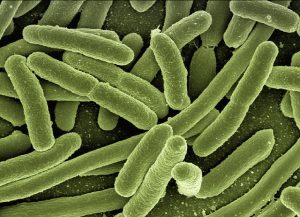“Antimicrobial Resistance is a global growing threat, and if we do not step up our action and commitment now, by 2050 it could cause more deaths than cancer”. This is the provocative statement made by the EU Commissioner for Health and Food Safety, Vytenis Andriukaitis, in June this year. (1) And he is not alone in his call to use antibiotics more carefully. In 2014 the Association of the Scientific Medical Societies in Germany (AWMF) developed a guideline on more appropriate handling of antibiotics in hospitals. The initiator of the guideline, Professor Dr. med. Winfried Kern, warns that doctors frequently prescribe a broad-spectrum antibiotic for common colds and explains that growing resistance is also caused by the widespread use of antibiotics in animal fattening as well as careless use in human and veterinary medicine. (2)
Why is an increased use of antibiotics problematic?
 Antibiotics are antimicrobial substances which are generally used to fight bacterial infections such as tuberculosis and pneumonia. They kill off the bacteria and thus prevent them proliferating further in the organism. When, conversely, bacteria change in such a way that the antibiotic is no longer effective against them, we speak of “antibiotic resistance”. These resistant germs are no longer ‘attacked’ in the course of treatment with antibiotics and consequently have an advantage over non-resistant bacteria. They are therefore better able to multiply. This applies equally to both animals and humans.
Antibiotics are antimicrobial substances which are generally used to fight bacterial infections such as tuberculosis and pneumonia. They kill off the bacteria and thus prevent them proliferating further in the organism. When, conversely, bacteria change in such a way that the antibiotic is no longer effective against them, we speak of “antibiotic resistance”. These resistant germs are no longer ‘attacked’ in the course of treatment with antibiotics and consequently have an advantage over non-resistant bacteria. They are therefore better able to multiply. This applies equally to both animals and humans.
There are two particular causes leading to an increased level of antibiotic resistance in the population:
1. Antibiotics being too quickly and carelessly prescribed in human medicine
2. Extensive use of antibiotics in animal husbandry
So-called β-lactam antibiotics are also being increasingly used. These should actually be a medicine of last resort, and only used when other antibiotics are no longer proving to be effective. The reason they are increasingly being used is the growing prevalence of infections involving multi-resistant germs, particularly in hospitals. Increased use of this reserve antibiotic (such as carbapenemases), however, is leading to the proliferation of bacterial strains which are often resistant to other antibiotic groups. This creates a vicious circle.
This topic is also becoming increasingly more relevant in agriculture. Industrial factory farming, in which animals are kept in cramped conditions, facilitates the proliferation of pathogens and infections. In order to prevent the animals getting diseases and the economic losses for the farmers connected with this, antibiotics are used prophylactically – often in healthy animals as well.
Currently in Germany, in the course of producing cheap meat, each year some 837 tons of antibiotics are used so that the animals survive the fattening period. The amount used has decreased by approximately half since 2011 yet the use of reserve antibiotics has increased, which needs to be assessed critically due to the significance of these antibiotics in human medicine.
 In 2011, germs which are resistant to carbapenems were also detected for the first time in the production of fattening pigs and broiler chickens. Since then such germs have been repeatedly detected in farm animals, despite the fact that this class of drugs is not approved for the treatment of animals in the European Union. So far it remains unclear as to where these pathogens come from. Intensive monitoring is required in this connection to prevent the meat from such animals being sold. By eating such meat, consumers could acquire resistance traits and consequently face problems when important medications are no longer effective against bacterial infections. (3)
In 2011, germs which are resistant to carbapenems were also detected for the first time in the production of fattening pigs and broiler chickens. Since then such germs have been repeatedly detected in farm animals, despite the fact that this class of drugs is not approved for the treatment of animals in the European Union. So far it remains unclear as to where these pathogens come from. Intensive monitoring is required in this connection to prevent the meat from such animals being sold. By eating such meat, consumers could acquire resistance traits and consequently face problems when important medications are no longer effective against bacterial infections. (3)
Antibiotics used to promote performance and growth have been banned in the EU in livestock farming since 2006. Since 2014 the amended German Medicines Act (16th amendment AMG) has also been in force, according to which the use of antibiotics has to be reported from a certain stock size upwards. If antibiotics are frequently used, measures must be taken to reduce this. (4)
In addition to growing resistance, increased use of antibiotics seems to be connected to the prevalence of chronic inflammatory gastrointestinal disorders, coeliac disease, allergies and obesity. Increased consumption of antibiotics could also be involved in the initiation and promotion of cancer. (5)
Is there a connection between increased use of antibiotics and cancer?
The human microbiota is an extremely well-balanced system of different bacterial strains. If, however, this balance is disrupted – for example, due to repeated use of antibiotics – the American Institute for Cancer Research (AICR) suggests this could lead to an increased risk of colorectal, lung and pancreatic cancer (6).
A Finnish study by Kilkkinen A et al has shown a connection between the frequency of antibiotic use and the likelihood of developing colorectal cancer (7). A recently published study by Cao, Y et al has also detected an increased risk of colorectal cancer when antibiotics are used on the long term. Taking antibiotics leads, at least temporarily, to a change in the bowel microbiota, which results in a loss of diversity and an altered composition of bacteria strains. This makes it easier for pathogens, for example, to become established in intestinal mucosa and thus cause inflammation.
Increased antibiotic use in early-to-middle adulthood seems to be particularly associated with increased risk of colorectal cancer. (5)
So what should you do? – The practical tip

Especially when buying food products of animal origin, your choices are crucial. Unfortunately, to be able to produce meat as cheaply as possible so-called factory farming methods are often implemented and these frequently entail the use of antibiotics. Buying meat, milk and eggs from farms in which animals are reared in line with high welfare standards and provided with enough access to the open-air can help to lower the intake of antibiotics and antibiotic-resistant bacteria through the consumption of such food products. Farmed fish, by the way, are often also contaminated with a high level of antibiotics.
A further point to consider is that an increased level of kitchen hygiene prevents the transfer of pathogens.
In human medicine, the dose and duration of treatment with antibiotics should be kept to a minimum. Early and targeted treatment with pathogen-specific substances is also beneficial.
Sources:
(1) EU-Kommission nimmt sich Antibiotika-Resistenz vor. S.l. : Springer Medizin, 30. Juni 2017, Ärzte Zeitung online.
(2) Gezielter und intelligenter Antibiotikaeinsatz kann Bakterien-Resistenzen mindern. Pressemitteilung. s.l. : Thieme-Verlag, 2014. https://www.thieme.de/de/neurologie/gezielter-intelligenter-antibiotikaeinsatz-kann-bakterien-resistenzen-mindern-61290.htm.
(3) Bundesinstitut für Risikobewertung (BfR). Antibiotikaresistenz: Carbapenemase-bildende Keime in Nutztierbeständen – Aktualisierte Mitteilung Nr. 036/2016 des BfR vom 23.12.2016. www.bfr.bund.de. [Online] 23. Dez 2016. http://www.bfr.bund.de/cm/343/antibiotikaresistenz-carbapenemase-bildende-keime-in-nutztierbestaenden.pdf.
(4) Bundesinstitut für Risikobewertung. Fragen und Antworten zu den Auswirkungen des Antibiotika-Einsatzes in der Nutztierhaltung. Aktualisierte FAQ des BfR vom 03. August 2016. [Online] August 2016. http://mobil.bfr.bund.de/de/faq/fragen_und_antworten_zu_den_auswirkungen_des_antibiotika_einsatzes_in_der_nutztierhaltung-128153.html#id.
(5) Long-term use of antibiotics and risk of colorectal adenoma. al., Cao Y et. 0, april 2017, Gut, S. 1-7. doi: 10.1136/gutjnl-2016-313413. .
(6) American Institute for Cancer Research (AICR). Investigating the Power of Bacteria. [Online] 2014. http://www.aicr.org/publications/newsletter/2014/124-winter/newsletter-investigating-the-power-of-bacteria.html?_ga=2.21791931.1226885447.1499355911-64783804.1499355911.
(7) Antibiotic use predicts an increased risk of cancer. al, Kilkkinen A et. 123, 2008, Int J Cancer , S. 2152–5.
